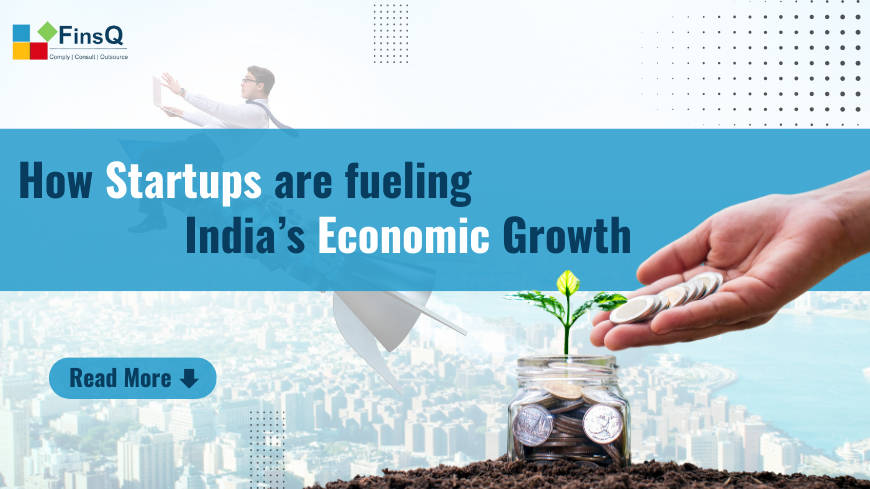India’s startup ecosystem is no longer just a niche segment of the economy—it’s a dynamic powerhouse, driving innovation, job creation, and economic acceleration. In fact, India now boasts the third-largest startup ecosystem in the world, with over 100,000 registered startups and more than 110 unicorns, each valued at over $1 billion. This explosive growth is not only transforming India’s economy, but also positioning it to become a global leader in innovation and technology.
The Job-Creation Engine: Startups as Employment Catalysts
Startups are redefining the job market in India. Over the past five years, they have created over 1 million jobs across various sectors, from technology to healthcare. Unlike traditional industries, which can be limited in scope, startups offer diverse opportunities, creating jobs that cater to a wide range of skills and backgrounds.
Take Swiggy and Zomato, for example. What began as small food delivery platforms have now become major players in India’s gig economy. Together, they employ over 300,000 delivery partners and thousands of others in operations, tech, and customer service. By offering flexible, on-demand work, these startups are empowering individuals from various backgrounds to earn a living while benefiting from the freedom that the gig economy provides.
Attracting Investments: Fueling Growth and Contributing to GDP
Startups are not only creating jobs—they are also attracting significant investments, both domestic and foreign. This influx of capital is playing a crucial role in India’s economic growth, contributing directly to GDP expansion.
In 2023 alone, Indian startups raised over $25 billion, with much of that money being pumped into high-growth sectors . This success story is just one example of how Indian startups are attracting foreign capital, bringing expertise back to India, and contributing to the nation’s economic standing on the global stage.
Disrupting Industries: Startups as Drivers of Innovation and Digital Transformation
Innovation is the lifeblood of any startup, and in India, these young companies are disrupting traditional industries through technology and digital solutions. Whether it’s AI-powered fintech, health-tech innovations, or blockchain solutions, startups are driving India’s digital transformation.
One shining example is UPI (Unified Payments Interface), a product of collaboration between fintech startups like PhonePe and Paytm. UPI has made India a global leader in digital payments, processing over 10 billion transactions per month. This revolution in digital financial services has not only simplified transactions but has also made banking accessible to even the most remote areas of the country, accelerating financial inclusion like never before.
Strengthening MSMEs: Empowering India’s Backbone
India’s Micro, Small, and Medium Enterprises (MSMEs) contribute 30% to the country’s GDP, but many of these businesses struggle with access to digital tools, credit, and efficient supply chains. Fortunately, startups are stepping up to fill this gap by providing B2B solutions tailored to the needs of MSMEs.
Consider Ofbusiness (OFB), India’s leading B2B e-commerce platform, which connects retailers with manufacturers and wholesalers. OFB has streamlined supply chains for over millions of businessess, empowering them with tools to scale, access credit, and increase profitability. This ecosystem of support is not just beneficial for MSMEs—it’s essential for India’s economic development, as MSMEs make up 99% of Indian businesses.
Empowering Entrepreneurship: A New Era of Economic Inclusion
One of the most inspiring impacts of the startup boom in India is the encouragement of entrepreneurship. The rise of India’s startup culture has opened doors for youth, women, and people in rural areas to enter the business world. With government initiatives like Startup India and Mudra Loans, capital is becoming more accessible to those who were previously excluded from the traditional banking system.
Lenskart is a prime example of how this entrepreneurial culture is thriving. Founded by Peyush Bansal, Lenskart began with the vision to make eyewear affordable and accessible. Today, Lenskart is valued at over $5 billion and has created thousands of jobs, inspiring a new generation of direct-to-consumer (D2C) brands that are reshaping the retail landscape.
Strengthening Global Competitiveness: India’s Startups on the World Stage
As startups continue to grow and expand, India is earning global recognition as a hub for innovation and technology. Indian unicorns are not just operating domestically—they are setting benchmarks in industries like SaaS (Software-as-a-Service), fintech, and e-commerce, attracting customers and investors from across the world.
One standout example is Freshworks, a Chennai-based SaaS company that made history by becoming the first Indian SaaS startup to list on the Nasdaq. Competing with global giants like Salesforce, Freshworks is a testament to India’s growing influence in the global tech ecosystem and its ability to compete on the world stage.
The Role of Virtual CFOs: Navigating the Financial Complexity of Startups
While startups are driving economic growth, their success hinges on effective financial management. This is where Virtual CFO services come into play. Virtual CFOs provide crucial support to startups, helping them navigate financial complexities and scale sustainably.
From managing cash flow to ensuring regulatory compliance, Virtual CFOs like those offered by FinsQ are essential for startups at every stage of growth. They help manage:
- Cash Flow: Ensuring businesses don’t run out of funds by optimizing financial flows.
- Investor Relations: Assisting in fundraising efforts and strategic financial planning.
- Regulatory Compliance: Keeping startups tax-compliant and audit-ready.
- Strategic Growth Advisory: Offering insights to scale operations and achieve long-term sustainability.
Final Thoughts: India’s Startup Ecosystem Is the Key to Economic Growth
India’s startup ecosystem is not just a driver of economic growth—it is reshaping the country’s future. By creating jobs, attracting investments, fostering innovation, and empowering entrepreneurship, startups are playing a pivotal role in positioning India as a global leader in technology and innovation.
With the right financial strategies and expert guidance from Virtual CFO services like FinsQ, startups can unlock their full potential, scale effectively, and contribute even more to India’s trillion-dollar dream. The future of India’s economy is in the hands of these dynamic entrepreneurs—and with the right financial oversight, their impact will only continue to grow.
Are you a startup looking to scale? Let FinsQ help you navigate the financial complexities and achieve long-term success.







